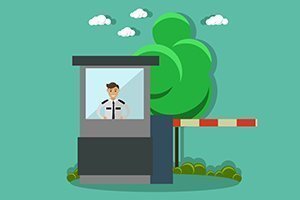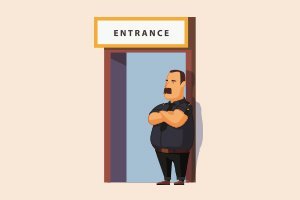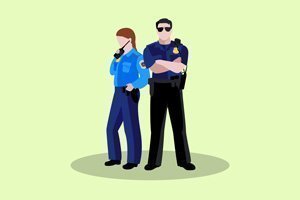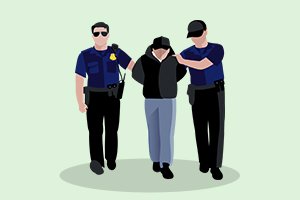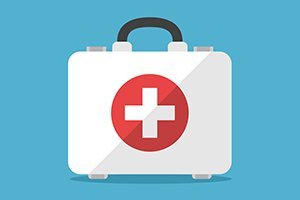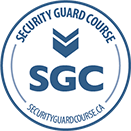Dual License: Security Guard and Private Investigator
This course is being temporarily offered by an SGC Partner - you will receive login instructions after purchase.
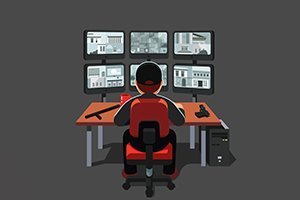
This course includes both the online Security Guard Course and Private Investigator Course and meets the Ministry requirements for both. Once completed, you will be eligible to write both exams and apply for your dual Security Guard and Private Investigator License.
Emergency First Aid & CPR (which is a requirement of the security guard course) is included if the student can attend a class listed here. For those who cannot attend one of these locations, you must complete your Emergency Level First Aid and CPR course separately.
What is a Dual Licence?
When you have a dual licence, you are able to work both as a security guard and as a private investigator in Ontario. If you are thinking about entering the security industry, you should seriously consider applying for a dual licence. When you have either the security guard or private investigator licence you will only be able to gain employment in one sector of the industry and be limited in opportunity. When you have a dual licence you will have the advantage of improved employability. Having a dual licence will broaden your job search, and you will increase your choices when it comes to the area of the private security or investigation field you wish to work in.
Holding a dual licence to be both a security guard and a private investigator has grown more popular with students and is viewed more favourably by employers. Our course is designed to prepare you for what you will experience in the real world. You will receive the full Ministry accredited lessons for both a security guard and private investigator, and you will learn how the skills complement each other.
Why having a dual licence is valuable
As private sector security and investigations continue to expand, holders of dual licences will find that they can enjoy a more successful career in the security industry. It will also allow you to join security guard and private investigator agencies with both skill sets and a well-rounded education which will serve you well in the field.
Even if you only plan on sticking to one sector of the security industry, you will find that it’s useful to have a background in both security and private investigation. A dual licence will enhance your security guard work by improving your investigative skills and legal knowledge. In addition to securing and guarding a location, your private investigator lessons will aid in assessing situations, identifying threats, and more.
By completing security guard training you will learn when use of force is necessary, the limitations to which you can use force, as well as self-defence techniques. Private investigators can find themselves in tricky situations at times, so it is essential to have basic self-defence skills.
To be certified in Use of Force training you should also complete our online Use of Force course found here.
The Security Guard Course Modules
The 12 online modules offer thorough lessons on everything you will need to know to be a successful security guard. Once students complete the Ministry requirements, they will be able to move on and apply for their provincial license.
Our syllabus covers topics such as: Health and Safety, the Canadian Legal System, Use of Force Theory and Report Writing. The online course is divided into 12 modules, each taking varying lengths to complete.
Here’s a simple breakdown of the online modules and what you can expect to learn when you choose Security Guard Course for your training:
Welcome and Licensing Process
This lesson consists of a brief introduction to the private security industry. You will receive a brief overview of the legislation as it applies to private investigators and security guards and how it will affect your role.
The Private Security and Investigative Services Act, 2005 and Ministry Code of Conduct
In this lesson you will learn the responsibilities of private security, according to the Private Security and Investigative Services Act, 2005 (PSISA). Pay close attention to the code of conduct as it outlines the rules and regulations you need to be aware of.
Basic Security Procedures
As a security guard, you will need to have a comprehensive knowledge of basic security procedures. Basic security procedures such as surveillance techniques, the protection of personal information, and the handling of substance abuse and drug paraphernalia will be covered in this module.
Writing Security Reports
Writing is an integral part of being a security guard and you will need to learn how to properly record situations. In this lesson, you will learn how to complete the typical written reports required by security guards and private investigators. These note taking skills are critical when recording witness statements or contact information as an event is occurring.
Health and Safety
You will gain a working knowledge of the Occupational Health and Safety Act and the Workplace Hazardous Materials Information System (WHMIS). You will then be able to apply this knowledge to whatever site you are assigned.
Emergency Response Preparation
You will be taught how to identify and respond to emergency situations in a timely and effective manner. The Emergency First Aid & CPR course will supplement this lesson’s training and provide more detailed instructions on how to address emergency situations.
Canadian Legal System
Security Guards must be aware of major legislation as it relates to their job and the properties they protect. You will be become familiar with the Criminal Court System, the Ontario Evidence Act, and the Canada Evidence Act.
Legal Authorities
You will learn about important legislation as it relates to your role as a security guard, as well as the Criminal Code of Canada, Municipal bylaws, and the elements of tort law in security.
Communication
Students will learn how to respond professionally and effectively in their role. The three main components are communication skills, tactical communication, and interpersonal skills.
Sensitivity Training
As a security guard you will encounter a diverse group of individuals every day. Treating everyone with kindness and respect is an important part of your job. That is why sensitivity training will teach you how to recognize your own biases, as well as the impact of mental, physical, cultural, and sexual differences.
Use of Force
While using force may be required of a security guard, you will learn about the importance of maintaining a professional composure and the limits of which you can apply force. The authority to use force under the Criminal Code of Canada and how to handle situations while under pressure will also be addressed.
To be certified in Use of Force training you should also complete our online Use of Force course found here.
The Private Investigator Course Modules
Private investigation work can take you to places you would never expect, which is why our private investigator lessons will cover everything required under Ministry standards, as well as provide practical knowledge you can use in the field.
Our private investigator course is a total of 50 hours and completed online.
The lessons in the private investigator course will cover a variety of topics, teaching students the legalities and practical knowledge they need to be an investigator. Below you will find a brief overview of the topics covered in our course.
Introduction to the Private Investigator Course and Government Testing Requirements/Procedures
This lesson is designed to prepare aspiring private investigators for the Ministry’s mandatory exam. It will outline key areas that you should be familiar with in order to pass the exam.
Introduction to the Private Investigation Industry
This lesson offers a brief history of the investigation industry and what private investigators can expect in Ontario. Learning about the history of the industry will help you gain a valuable understanding of where the industry began and how far it has come.
The Private Security and Investigative Services Act, 2005 (PSISA)
As a private investigator, the Private Security and Investigative Services Act, 2005 is your code of conduct and legislates your responsibilities. Students should study the Act and be aware of their duties and restrictions while working in the field to ensure they do not work outside any regulations and are following relevant laws.
Provincial and Federal Statutes
While you won’t be an officer of the law (peace officer), you will still be working within the federal and provincial statutes that relate to the industry. There are certain regulations that you need to be aware of, and this lesson will outline them. You will gain a comprehensive understanding of the statutes that apply to your role.
Criminal and Civil Law
Private investigators are expected to work in accordance with criminal and civil legislative and procedural requirements, while abiding by the policies of their own organization. It can be difficult to balance all the regulations you need to work within, especially in a high pressure position such as this. This module will teach you how to achieve an optimal balance and be successful in your role.
Investigative Techniques
Investigations will be a significant part of your role. You may be hired to follow a spouse suspected of being unfaithful, or to track down the location of someone. Whether you are hired to work on a civil or a criminal case, there is one thing you can be sure of: you will need analytical investigative skills to get the job done and professional conduct to ensure your work supports the legal case you are assisting with. Research, surveillance, interviews, and the use of special equipment will all be covered. We won’t just teach you how to use these techniques — we will also teach you when it’s appropriate to use them.
Principles of Ethical Reasoning and Decision-Making
As a private investigator you will have to work on a wide range of cases that will require a working knowledge of legal human rights. It may be hard to admit, but everyone has their own personal biases. Having these biases is a part of human nature however you will have to work past them when conducting an investigation. Our ethical reasoning and decision-making lesson will teach you about anti-discrimination, the Ontario Human Rights Commission, and how to avoid violations of the Charter of Rights and Freedoms.
Key Principles of Communication and Interaction
Communication plays a large role in investigative work. Whether you are interviewing a suspect or speaking to witnesses, you will need to be able to effectively communicate with those around you and interpret their communicative and social cues. This lesson will teach you all you need to know about tactical communication and interpersonal skills.
Self-Management Skills
Some private investigators choose to join a company when they become licensed and are ready to enter the workforce, while others may want to branch out. Whatever you choose, it’s important to have self-management skills and to be able to regulate yourself. This lesson will teach you how to assess your own roles and responsibilities so that you’ll be able to work effectively in a team or individually.
The SGC Advantage
- Hundreds of quiz questions
- Phone and email support 7 days a week
- 1 year access to your course

